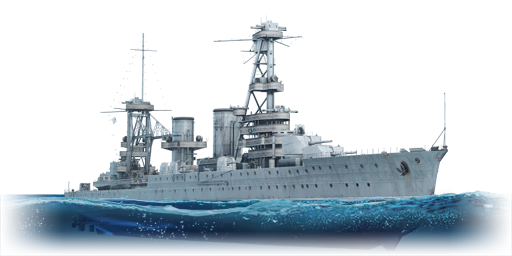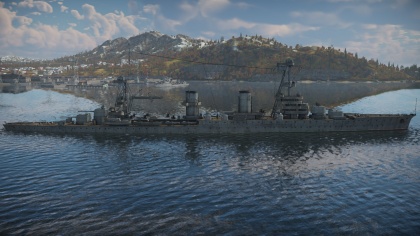Difference between revisions of "Krasny Kavkaz"
Inceptor57 (talk | contribs) (→History: Added history from devblog) |
(→Armament: links) |
||
| Line 18: | Line 18: | ||
== Armament == | == Armament == | ||
=== Primary armament === | === Primary armament === | ||
| − | ''Provide information about the characteristics of the primary armament. Evaluate their efficacy in battle based on their reload speed, ballistics and the capacity of their shells | + | {{main|180 mm/60 B-1-K (180 mm)}} |
| + | ''Provide information about the characteristics of the primary armament. Evaluate their efficacy in battle based on their reload speed, ballistics and the capacity of their shells.'' | ||
''Broadly describe the ammunition available for the primary armament, and provide recommendations on how to use it and which ammunition to choose.'' | ''Broadly describe the ammunition available for the primary armament, and provide recommendations on how to use it and which ammunition to choose.'' | ||
=== Secondary armament === | === Secondary armament === | ||
| + | {{main|Minizini (100 mm)|34-K (76 mm)|45 mm/46 21-K (45 mm)}} | ||
''Some ships are fitted with weapons of various calibres. Secondary armament is defined by the weapon chosen with the control <code>Select secondary weapon</code>. Evaluate the secondary armament and give advice on how to use them. Describe the ammunition available for the secondary armament. Provide recommendations on how to use them and which ammunition to choose. Remember that anti-air armament, even heavy calibre weapons, belong in the next section.'' | ''Some ships are fitted with weapons of various calibres. Secondary armament is defined by the weapon chosen with the control <code>Select secondary weapon</code>. Evaluate the secondary armament and give advice on how to use them. Describe the ammunition available for the secondary armament. Provide recommendations on how to use them and which ammunition to choose. Remember that anti-air armament, even heavy calibre weapons, belong in the next section.'' | ||
| − | |||
| − | |||
=== Anti-aircraft armament === | === Anti-aircraft armament === | ||
| + | {{main|70-K (37 mm)|DShK (12.7 mm)|Vickers Mk.V (12.7 mm)}} | ||
''An important part of the ship’s armament responsible for air raid defense. Anti-aircraft armament is defined by the weapon chosen with the control <code>Select anti-aircraft weapons</code>. Talk about the ship’s anti-air cannons and machine guns, the number of guns and their positions, their effective range, and about their overall effectiveness – including against surface targets.'' | ''An important part of the ship’s armament responsible for air raid defense. Anti-aircraft armament is defined by the weapon chosen with the control <code>Select anti-aircraft weapons</code>. Talk about the ship’s anti-air cannons and machine guns, the number of guns and their positions, their effective range, and about their overall effectiveness – including against surface targets.'' | ||
| − | |||
| − | |||
=== Torpedo armament === | === Torpedo armament === | ||
| + | {{main|45-36NU (450 mm)}} | ||
''Many ships are armed with torpedo launchers, and for some vessels such as boats, torpedoes are an extremely important means of defeating an opponent. Evaluate the position of the torpedo launchers, discuss the ammunition available, firing specifics such as dead zones, features of the torpedoes themselves, etc.'' | ''Many ships are armed with torpedo launchers, and for some vessels such as boats, torpedoes are an extremely important means of defeating an opponent. Evaluate the position of the torpedo launchers, discuss the ammunition available, firing specifics such as dead zones, features of the torpedoes themselves, etc.'' | ||
| − | |||
| − | |||
| − | |||
| − | |||
| − | |||
== Usage in battles == | == Usage in battles == | ||
Revision as of 08:49, 30 January 2020
Contents
Description
The Svetlana-class, Krasny Kavkaz, 1944 is a rank III Soviet light cruiser
with a battle rating of 4.7 (AB/RB/SB). It was introduced during Update 1.79 "Project X" when the Soviet fleet was implemented into the game.
General info
Survivability and armour
Talk about the vehicle's armour. Note the most well-defended and most vulnerable zones, e.g. the ammo magazine. Evaluate the composition of components and assemblies responsible for movement and manoeuvrability. Evaluate the survivability of the primary and secondary armament separately. Don't forget to mention the size of the crew, which plays an important role in fleet mechanics. Tips for preserving survivability should be saved for the "Use in battle" section.
If necessary, use a graphic template to show the most well-protected or most vulnerable points in the armour.
Mobility
Write about the ship’s mobility. Evaluate its power and manoeuvrability, rudder rerouting speed, stopping speed at full tilt, with its maximum forward speed and reverse speed.
Armament
Primary armament
Provide information about the characteristics of the primary armament. Evaluate their efficacy in battle based on their reload speed, ballistics and the capacity of their shells.
Broadly describe the ammunition available for the primary armament, and provide recommendations on how to use it and which ammunition to choose.
Secondary armament
Some ships are fitted with weapons of various calibres. Secondary armament is defined by the weapon chosen with the control Select secondary weapon. Evaluate the secondary armament and give advice on how to use them. Describe the ammunition available for the secondary armament. Provide recommendations on how to use them and which ammunition to choose. Remember that anti-air armament, even heavy calibre weapons, belong in the next section.
Anti-aircraft armament
An important part of the ship’s armament responsible for air raid defense. Anti-aircraft armament is defined by the weapon chosen with the control Select anti-aircraft weapons. Talk about the ship’s anti-air cannons and machine guns, the number of guns and their positions, their effective range, and about their overall effectiveness – including against surface targets.
Torpedo armament
Many ships are armed with torpedo launchers, and for some vessels such as boats, torpedoes are an extremely important means of defeating an opponent. Evaluate the position of the torpedo launchers, discuss the ammunition available, firing specifics such as dead zones, features of the torpedoes themselves, etc.
Usage in battles
Describe the technique of using this ship, the characteristics of her use in a team and tips on strategy. Abstain from writing an entire guide – don’t get try to provide a single point of view, but give the reader food for thought. Talk about the most dangerous opponents for this vehicle and provide recommendations on fighting them. If necessary, note the specifics of playing with this vehicle in various modes (AB, RB, SB).
Pros and cons
Summarize and briefly evaluate the vehicle in terms of its characteristics and combat effectiveness. Mark its pros and cons in the bulleted list. Try not to use more than 6 points for each of the characteristics. Avoid using categorical definitions such as "bad", "good" and the like - they have a substitution in the form of softer "inadequate", "effective".
Pros:
Cons:
History
The Krasny Kavkaz or as it was initially named, the Admiral Lazarev, was a ship of the Svetlana-class light cruisers, laid down in 1913 for the Imperial Russian Navy at the Russud dockyard. The ship’s construction went according to plan through the duration of The Great War(WW1) until the outbreak of the October Revolution in Russia in late 1917 caused construction to cease, with the ship being just above halfway completed.
After capturing the mostly intact ship, the Soviets decided to complete its construction and renamed it to Krasny Kavkaz in late 1926. The ship was completed to a modernized design, changing its initial layout and armaments significantly, in order to meet modern requirements. After more than two decades, the Krasny Kavkaz was finally commissioned into service with the Navy in January 1932 as the most advanced Soviet cruiser of the time.
The ship’s career was already off to a bad start however, as only months after leaving the drydock, she suffered severe damages to the bow after colliding with another light cruiser. After her bow was extensively rebuilt, she made several visits to ports in Greece, Turkey and Italy in 1933. Prior to the German invasion of the USSR, she underwent one more retrofit, which greatly increased her anti-aircraft armament.
The service life of the Krasny Kavkaz during WW2 was defined by her involvements in numerous Black Sea operations, most notably around the coastal cities of Odessa, Sevastopol, Novorossiysk and the Kerch peninsula. However, she also took part in various other missions, including convoy escorts, troop transport, fire support and many more. After Stalin forbade the use of large naval vessels without his personal consent in 1943, Krasny Kavkaz saw no further action, marking the end of her wartime service.
After WW2, Krasny Kavkaz was converted to a training ship in 1947 and was later used as a target ship in 1952, before being sunk by an anti-ship cruise missile.
- From Devblog
Media
An excellent addition to the article will be video guides, as well as screenshots from the game and photos.
See also
Links to the articles on the War Thunder Wiki that you think will be useful for the reader, for example:
- reference to the series of the ship;
- links to approximate analogues of other nations and research trees.
External links
| USSR light cruisers | |
|---|---|
| Imperial Russia | |
| Svetlana-class | Krasny Krym* · Krasny Kavkaz* |
| * Laid down by Imperial Russian Navy; Finished and renamed by the USSR | |
| Project | Soviet Union |
| Pr.26 | Kirov · Voroshilov · Maxim Gorky |
| Pr.68 | Chapayev · Zheleznyakov |
| Pr.68-bis | Sverdlov · Mikhail Kutuzov |
| Pr.68-bis-ZiF | Shcherbakov |
| Lend-Lease | USA |
| Omaha-class | Murmansk |
| Trophies | Italy |
| Condottieri-class | Kerch |





